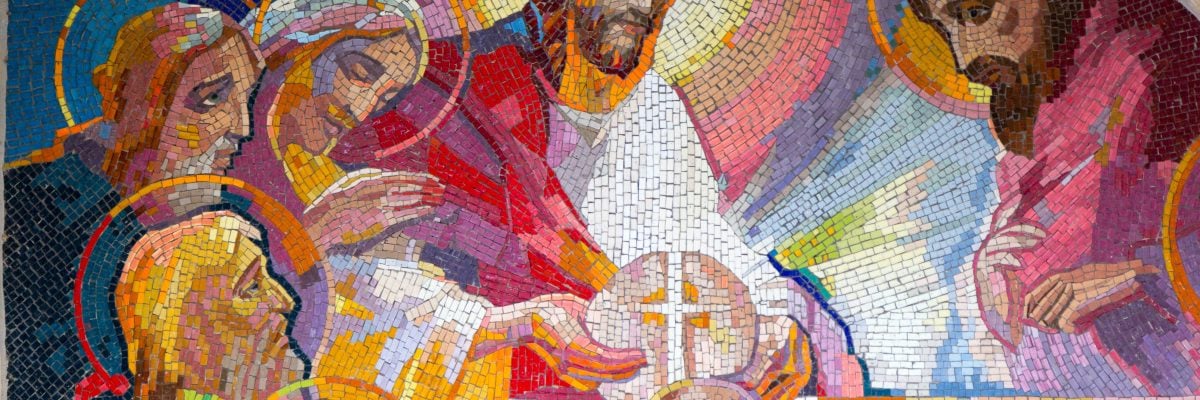
Long before my conversion to Catholicism I was bothered by the stale Protestant claim that Jesus was speaking metaphorically in all of the Scripture passages about the Eucharist. I try to pay careful attention to words and believed that God wasn’t reckless with his own, so this argument was painfully inadequate to justify the anti-transubstantiation position. It was as though I was supposed to believe that Jesus didn’t understand how metaphors work.
Christ’s metaphors are layered with meaning
Yes, Christ spoke metaphorically at times, and examples are easy to find:
John 8:12 – I am the light of the world; he who follows me will not walk in darkness, but will have the light of life.
John 14:6 – I am the way, and the truth, and the life; no one comes to the Father, but by me.
John 15:5 – I am the vine, you are the branches. He who abides in me, and I in him, he it is that bears much fruit, for apart from me you can do nothing.
Each of these metaphors is simple to understand: As walking in darkness can be difficult and can promote anxiety, so is the life that is not lived for Christ. Of course, there’s more going on with these “I am” statements than the obvious metaphors, but the metaphors are important and easy to comprehend. Jesus is not photons. Jesus is not a shrub. And, frankly, I can easily forgive someone who says, “Jesus isn’t bread,” also, when referring to Eucharistic dialogue. It’s not hard to reach that conclusion, too, when you read, “I am the bread of life; he who comes to me shall not hunger, and he who believes in me shall never thirst” (John 6:35).
As is often the case with the words of God, the meaning is layered.
Consider the depth of meaning behind the Savior’s words, “I am the way, and the truth, and the life.” Participation in the life and truth of Jesus is how man comes to the Father, but the more fundamental truth here is that Jesus, the Second Person of the Trinity, is life itself, and he is truth itself!
That is not say that Jesus is bread itself. We understand that Jesus provides spiritual sustenance, and it is legitimate to recognize that meaning. However, there is a deeper meaning in this particular “I am” statement.
In the Eucharistic discourse, he says, “I am the living bread which came down from heaven; if any one eats of this bread, he will live forever; and the bread which I shall give for the life of the world is my flesh” (John 6:51). This is where Protestant me struggled the most: I would think is Jesus really this bad at metaphors? Some of this is metaphor, clearly, but does one metaphor made the entire discourse metaphoric?
See, Protestants don’t treat the entire discourse as metaphor. They do not claim that Jesus didn’t suffer in the flesh or that giving up his life was anything but literal. So, they end up with a part-metaphor, part-literal predicament: “I, Jesus, am metaphoric living bread, and you will live forever if you metaphorically eat this metaphoric bread, which is me, and which is also my literal flesh, which I will literally give for the world.” This is untenable. It’s nonsense. The best the anti-literal interpretation can do is say that Jesus is mixing metaphors, where “to eat” is actually “to believe” and where bread “is flesh” but only as the “representation of Jesus.”
How do we know the difference?
If we work backwards, recognizing first that Jesus actually gives his true flesh for the world on Calvary, and listen to him when he says that “the bread . . . is my flesh,” then we can come to a defensible conclusion. The defensible conclusion is, of course, the literal one, which accounts for Jesus’ tenacity and visceral language in the long Bread of Life discourse. Still, what really puts the nail in the coffin of the metaphor-only presumption is what Jesus did at the Last Supper.
Jesus said he was a good shepherd, but he never gave the apostles a herdsman and said, “This is me.” Christ said that he was the light, but he never presented a flame to his disciples and declared, “This flame is my flesh.” Maybe if the sixth chapter of John didn’t exist one could make it sound reasonable to believe that Christ’s words at the Last Supper meant, “Take, eat; this represents my body (and your eating is representative of believing).” However, the existence of John 6 makes that interpretation seem inadequate and unsupported.
One day Jesus is losing a ton of his followers because he’s adamantly repeating that it is necessary to “gnaw” on his flesh, and a short time later he’s blessing bread and telling his disciples to “eat this; it’s my body.” It’s time to stop talking about metaphors. The Son of God knows what they are—he had a perfect human nature and perfectly understood how to communicate with mankind—and the Eucharistic dialogue just isn’t one of them.



